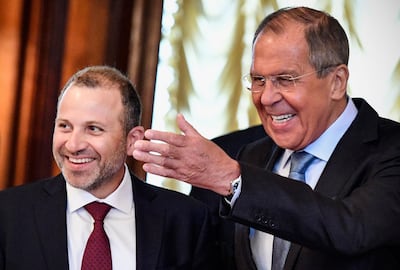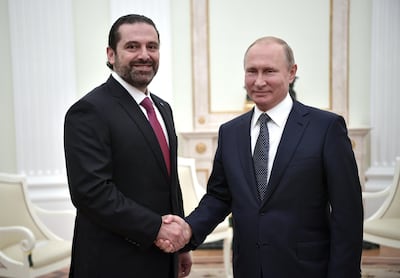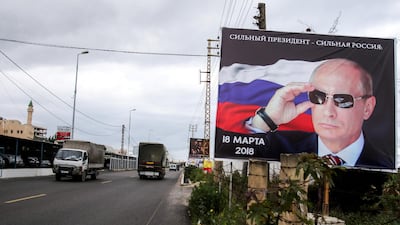Russia’s recent purchase of an ageing oil storage centre in Lebanon is part of the Kremlin’s latest push to assert its influence across the region through energy deals with political overtones.
Rosneft, Russia’s state-owned oil company, closed a deal in late January to rent, operate and expand storage near the northern Lebanese city of Tripoli.
“The contract will allow the redevelopment of oil facilities in Tripoli and additional funding for it will be made in stages,” said Lebanon’s then caretaker energy minister Cesar Abi Khalil.
The ministry withheld key details about the deal, such as its value and the identity of other bidders.
The agreement’s lack of clarity has led to speculation about Russia’s motives. Neither Rosneft, nor the Minister of Energy, Nada Boustani, would comment.
Rosneft, which is led by Russian President Vladimir Putin’s close ally Igor Sechin, is set to operate the 90-year-old facilities for two decades and to expand it, first to 450,000 tonnes, then to 1.5 million.
There is no public information on the site’s current capacity.
Destroyed in part during the Lebanese civil war, the site has been used by the government to store imported diesel for the post-war local market, says Laury Haytayan, Mena director at the Natural Resource Governance Institute.
Russia is using Rosneft as foreign policy tool. Lebanon is poised for its first oil and gas exploration after licensing two offshore blocks in December 2017.

In recent years, Moscow has used Rosneft to deepen ties with governments in Middle East countries where the West has struggled to bring stability.
In late 2017, Rosneft signed a deal with the Libyan state oil company to invest in exploration and production.
Moscow has thrown its weight behind eastern Libya’s Field Marshal Khalifa Haftar, a rival to the government in Tripoli, and sees allies in both parties to the conflict.
In the same month, Rosneft announced an agreement to buy oil from the Kurdish government in northern Iraq.
Infighting between Kurdish officials and Baghdad has jeopardised those investments but the deal has made Mr Sechin a key broker in Iraqi political disputes.
Rosneft’s move into Lebanon, a country pulled between ties to the West and Iran, also combines economics and politics, analysts say.
“Compared to other countries in the region, Lebanon is still a virgin energy market and can offer the potential of first mover’s advantage,” said Carole Nakhle, founder and chief executive of Crystol Energy.
“But its political landscape is probably more interesting.”
Ms Haytayan said: “A possible scenario is that Russia wants to link a group of countries such as Iran, Iraq, Syria and Turkey through energy to counter other energy alliances in the region such as Jordan, Egypt, Israel, Cyprus and Greece.”
Lebanon, backed by the US and Europe, has been leaning towards Russia as a strategic partner since Moscow offered to co-ordinate the return of Syrian refugees.
There have also been talk of arms deals for Beirut, and business agreements. US and European allies have expressed concern over ties between Moscow and Beirut.
South Lebanon once had a large communist party and therefore strong links to the Soviet Union.
They have endured after the collapse in 1990 as many in the southern region who speak the language are married to Russians and many have the right to vote in Russian elections.
President Michel Aoun this week announced he would be travelling to Moscow for a long-awaited meeting with Mr Putin at the end of this month.
The two are expected to discuss relations, refugee return and energy.
Moscow already secured a foothold in the Lebanese oil and gas sector last year through gas major Novatek, which signed a deal to explore and produce offshore hydrocarbons as part of a consortium including France’s Total and Italy’s Eni.

Rosneft also competed in a public tender to operate a floating storage and regasification unit along with Norway’s BW, Switzerland’s Vitol, Lebanon’s Butec and Saudi Arabia’s Almabani.
Results of the tender, which attracted eight consortiums, are expected in the next few weeks.
But the Tripoli deal appears to be pivotal in Russia’s economic strategy in the region, as it is connected to major oilfields in which Rosneft has a stake.
The pipelines have been inoperative for decades but the Tripoli facilities used to store oil sent from the northern Iraqi city of Kirkuk, home to some of the Middle East’s largest and oldest oilfields.
Mr Abi Khalil in January said there were plans to rehabilitate the Kirkuk pipeline, a prospect riddled with political and financial obstacles, including the need to cross Syria.
Russia has the advantage in such a deal as a major backer of Syrian President Bashar Al Assad, and is set to be heavily involved in the country’s reconstruction.
Moscow has also has good relations with Lebanon’s Hezbollah and Iran, both powerful forces in Beirut.
“It is not the first time the rehabilitation of the pipeline is discussed,” Ms Nakhle said.
“Based on commerciality alone, it will be a major investment and requires a truly convincing rationale for its viability, and this has not been properly made yet.”
But some observers caution against underestimating economics in the Rosneft deal with Lebanon.
The company is majority owned by the Russian state but BP and Qatar hold about 20 per cent and would object to deals that did not make commercial sense, said Chris Weafer, a partner at Macro Advisory in Moscow.
But the deal’s lack of transparency remains problematic in Lebanon as its local impact cannot be estimated.
Analysts can only speculate on whether Rosneft would target the Lebanese market or choose to export to other regions such as Europe.

